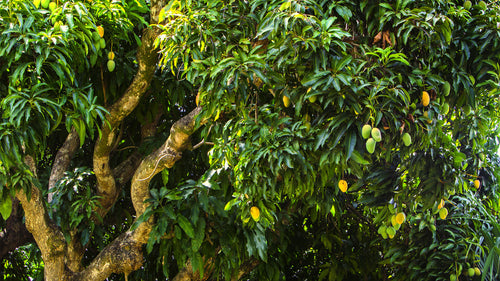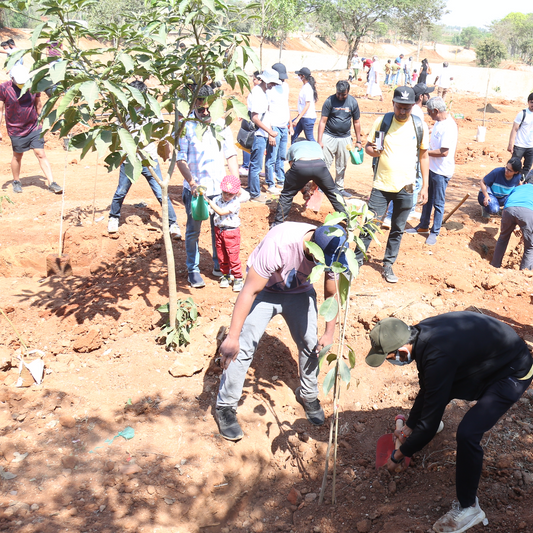Dr. Shilpi Reddy Foundation & KIMS Hospital: Celebrating The Birth Of Each Girl Child with Tree Plantation
The Dr. K Shilpi Reddy Foundation, in collaboration with KIMS Hospital, has embarked on a profound and inspiring journey by launching a unique tree pl Read more
Plantation Site Gallery
Project Update 2
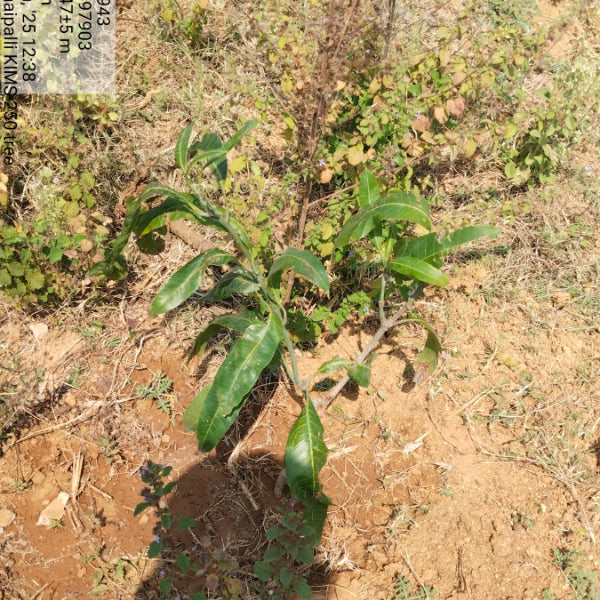
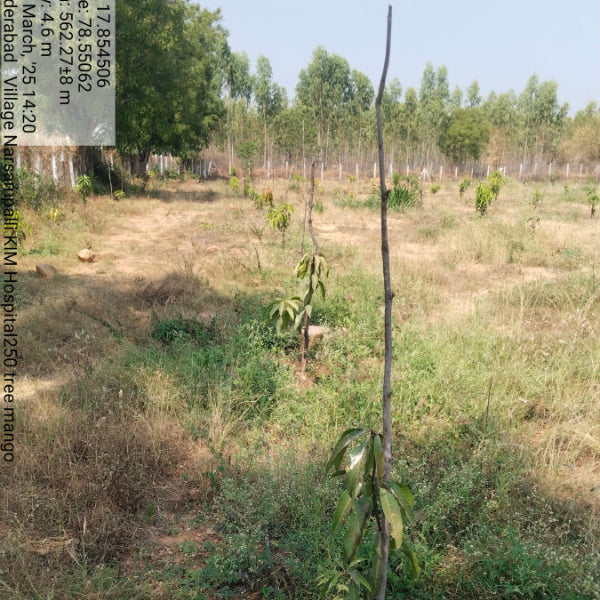
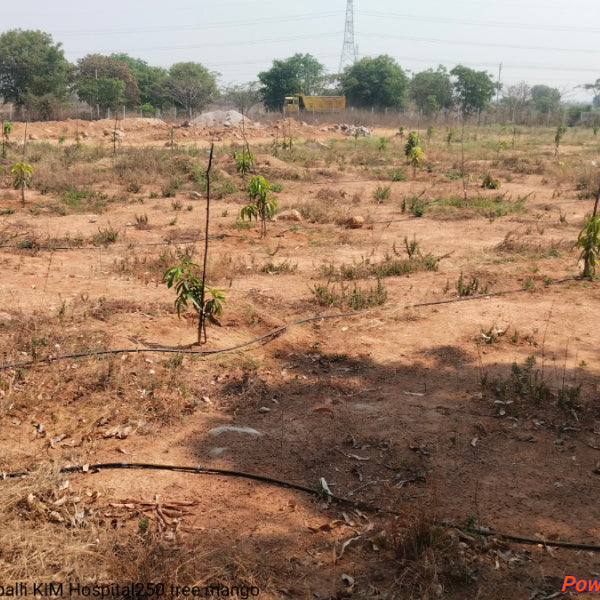
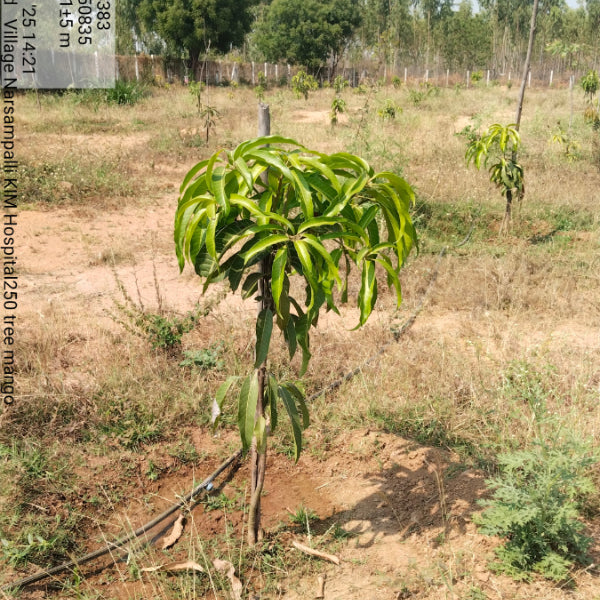
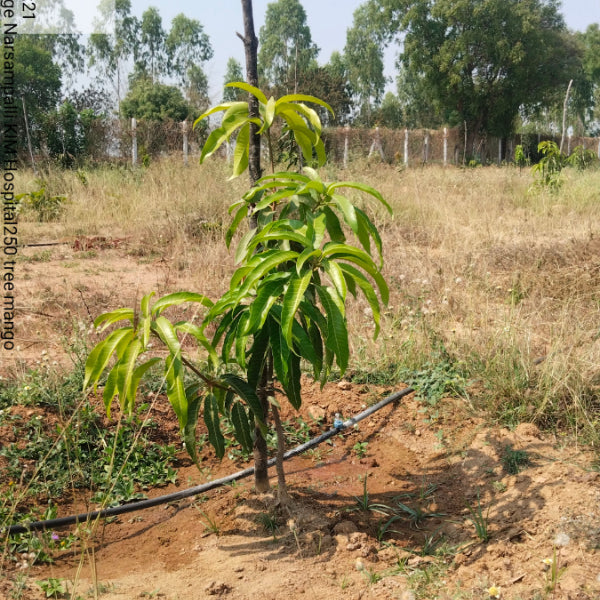
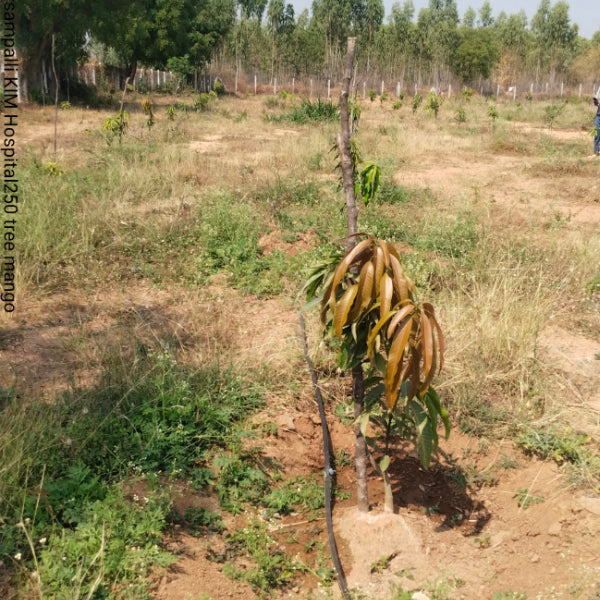
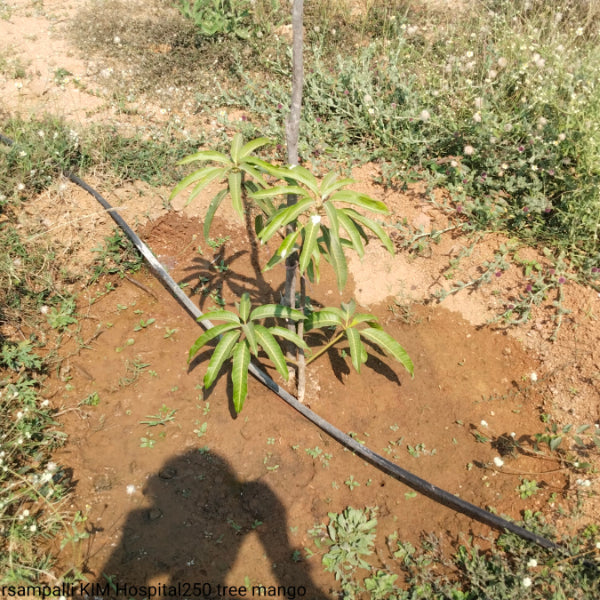
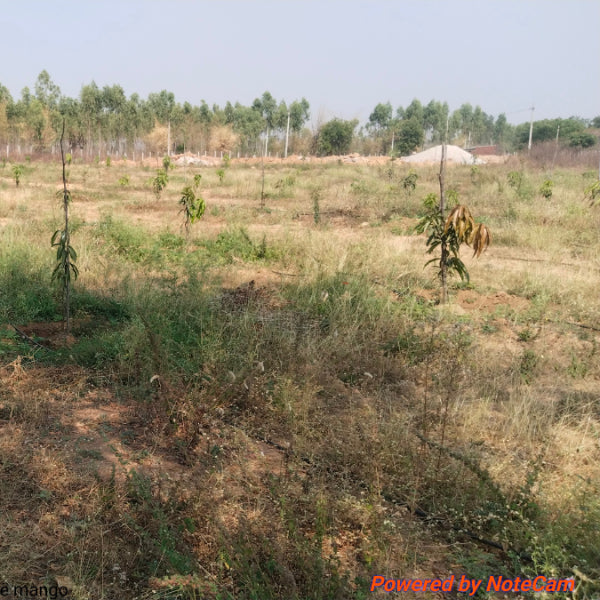
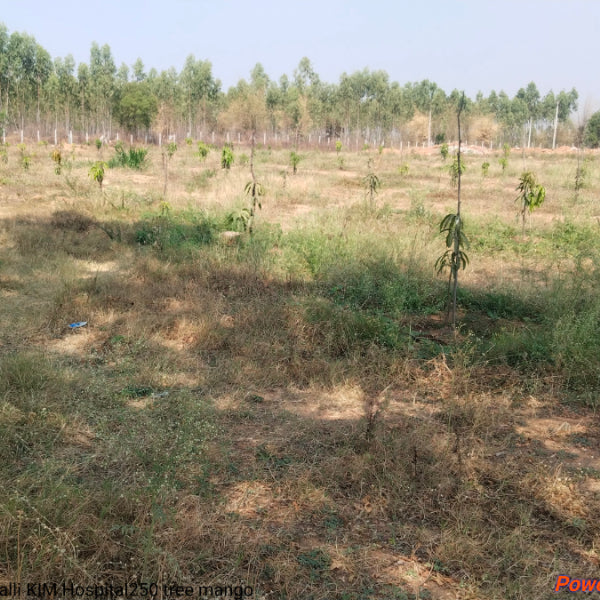
Project Update 1
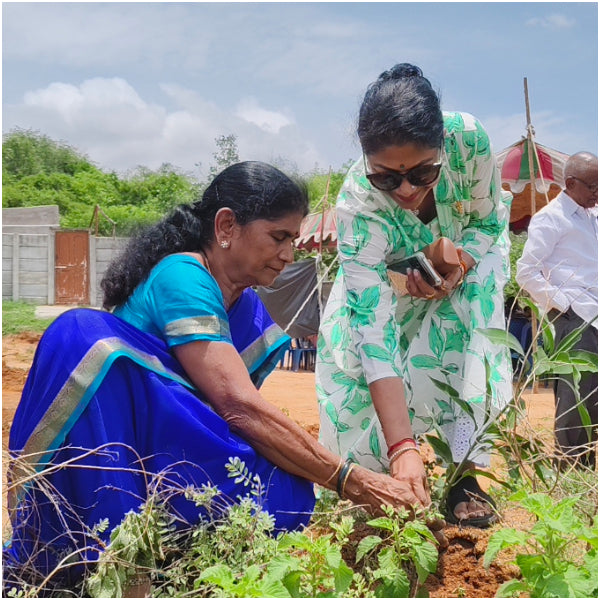
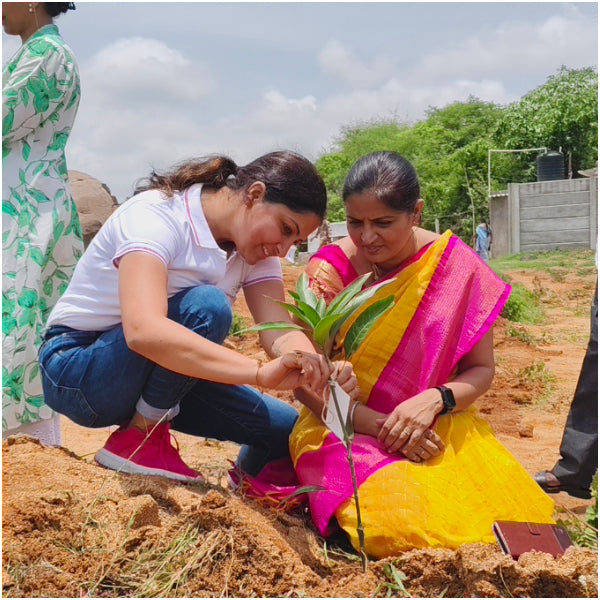
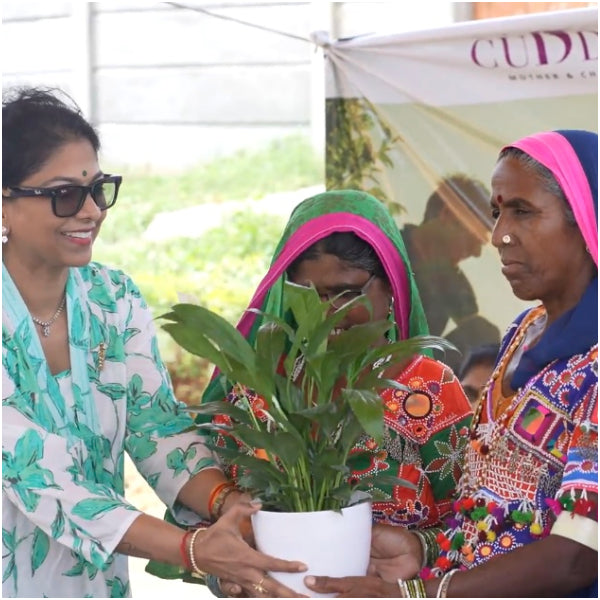
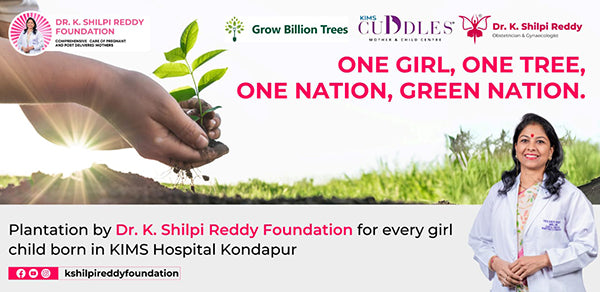
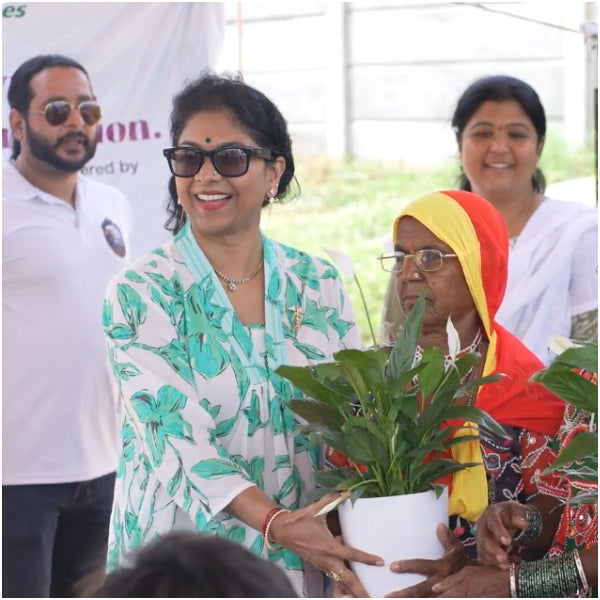
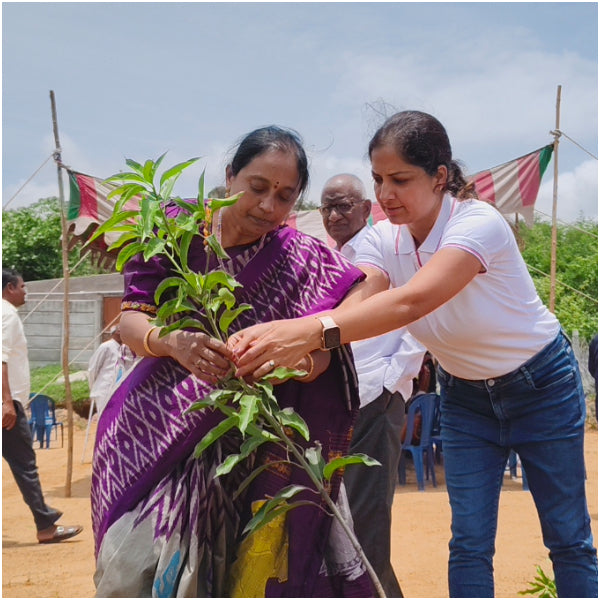
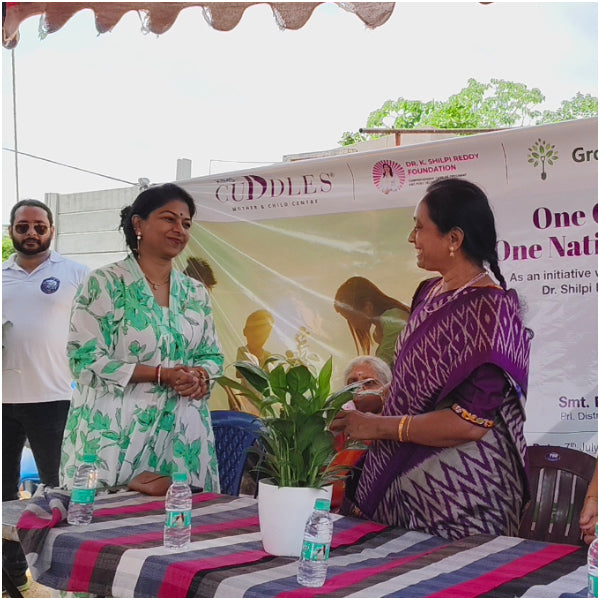
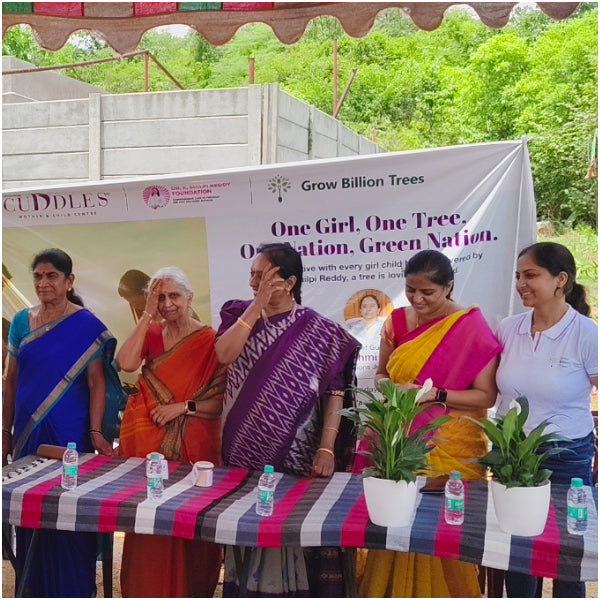
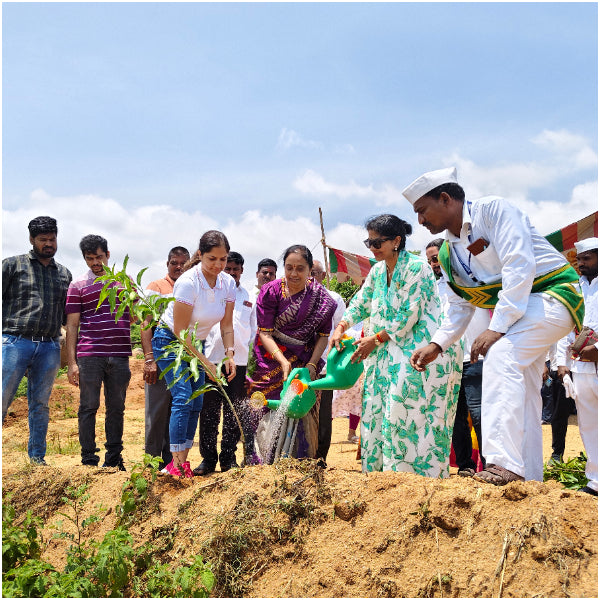
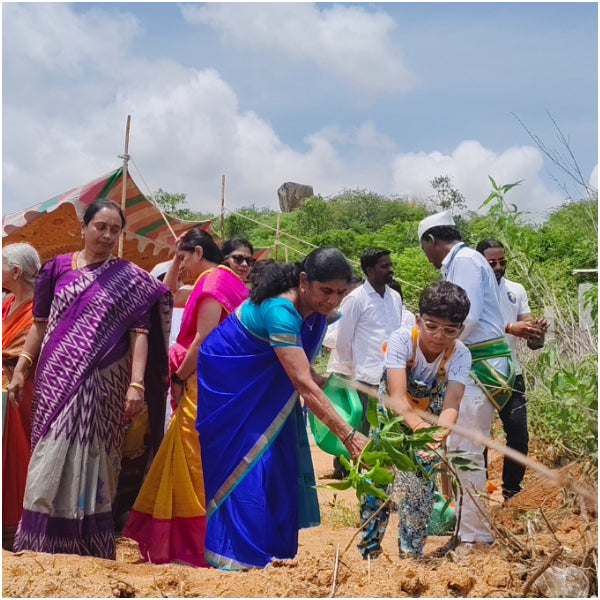
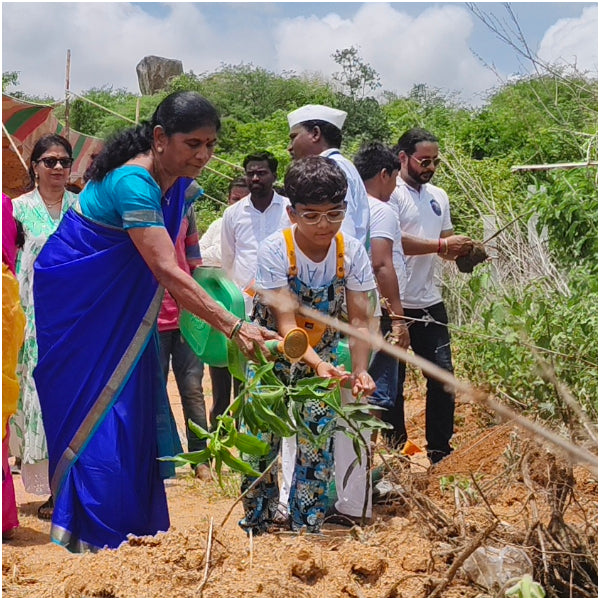
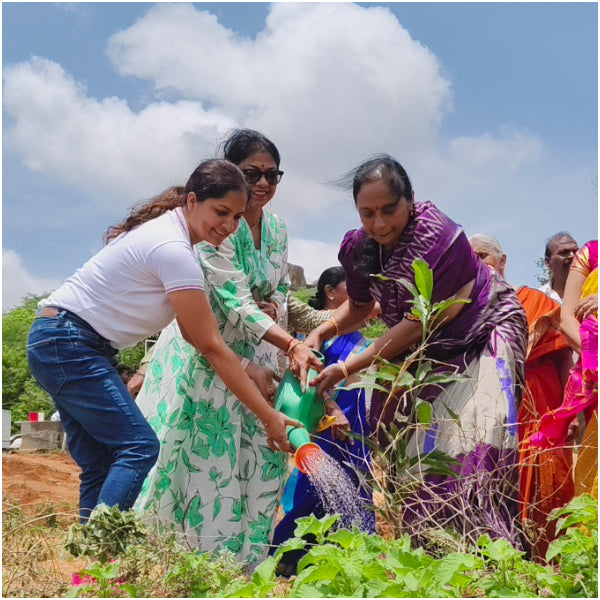
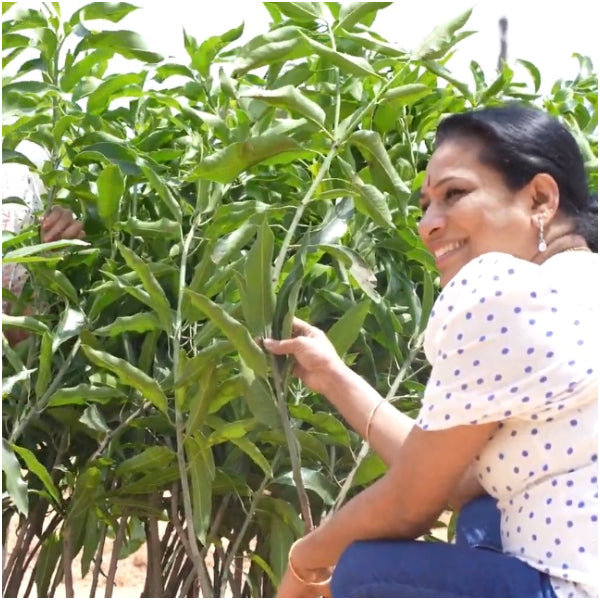
Digital Forest
Forest with 252 Trees planted
Dr. Shilpi Reddy Foundation & KIMS Hospital: Celebrating The Birth Of Each Girl Child with Tree Plantation
The Dr. K Shilpi Reddy Foundation, in collaboration with KIMS Hospital, has embarked on a profound and inspiring journey by launching a unique tree plantation initiative rooted in the agroforest concept. This heartfelt initiative celebrates the birth of every girl child at the hospital by planting a tree in her honor, symbolizing life, strength, and sustainability. Aptly themed “One Girl, One Tree, One Nation, Green Nation,” the campaign beautifully intertwines the celebration of new life with the nurturing of our planet.
At the heart of this initiative lies a dual mission: to champion environmental conservation and to elevate the societal value of every girl child. Each tree planted not only contributes to the creation of biodiverse agroforests but also serves as a source of improved livelihoods for local farmers. Agroforestry enhances soil health, supports biodiversity, and creates sustainable income opportunities through the sale of fruits, timber, and other tree-based products. By integrating trees into agricultural landscapes, farmers gain long-term economic resilience while contributing to ecological restoration. These living legacies, planted in honor of each girl child, embody hope for both a greener planet and a more prosperous rural economy.
By aligning environmental stewardship with gender equity, the Dr. K Shilpi Reddy Foundation and KIMS Hospital are sowing the seeds for a greener, more inclusive India. Together, we can nurture a future where every girl child is celebrated and every tree planted becomes a beacon of sustainable hope.
Project Planning & Execution
No of Trees: 252
Plantation Location: Nadimi Thanda Gram Panchayat, Chetlathimmaipally, Masaipet Mandal, Medak District, Hyderabad, Telangana 502335
Plantation Date: 7th July 2024
Name of Species: Mango
Species Selection & Its Benefits:
The initiative prioritises the planting of native tree species, ensuring high survival rates and fostering long-term ecological stability. By aligning tree selection with local market demand, the project enhances environmental sustainability and provides farmers with viable income opportunities. Farmer consent and participation play a crucial role in species selection, ensuring that the chosen trees integrate seamlessly with existing agricultural practices.
Mango (Mangifera indica), specifically the Kesar and Dasheri varieties, was strategically selected for this initiative due to its numerous ecological, economic, and social advantages. Known for their longevity and high commercial value, these Mango varieties provide a sustainable source of income for farmers through fruit production while contributing to soil conservation, carbon sequestration, and biodiversity enhancement. Additionally, Mango orchards help reduce soil erosion, improve water retention, and create a favourable microclimate for surrounding crops.
This carefully planned selection strengthens environmental conservation and farmer livelihoods, reinforcing Dr. K. Shilpi Reddy Foundation & Kims Hospitals’ commitment to sustainable development and rural prosperity.
Beneficiaries Details
| SN | Farmer Name | Google Location | Village Name | Plot Size | Mango Planted |
| 1 | K.V.Sunita Rao | https://tinyurl.com/uvsbh249 | Chetlathimmaipally | 1.20 Acre | 252 |
Planting Methodology and Its Advantages
Agroforestry: Dr. K. Shilpi Reddy Foundation & Kims Hospitals’ tree plantation initiative is rooted in the agroforestry concept, a sustainable land management practice that enhances environmental conservation while improving farmer livelihoods. By integrating 252 Mango trees within agricultural landscapes, this initiative provides farmers with an alternative income source and supports long-term ecological balance. Agroforestry reduces reliance on chemical fertilisers, improves soil health, enhances water retention, and minimises soil erosion, ensuring long-term agricultural sustainability. Additionally, it promotes biodiversity, fosters natural pest control, and creates microclimatic benefits such as temperature regulation, wind protection, and shade for companion crops.
Dr. K. Shilpi Reddy Foundation recognises agroforestry as a strategic approach to carbon sequestration, ecological restoration, and sustainable land use. This initiative reflects the company’s commitment to responsible environmental practices, reinforcing its role in rural development and sustainable agriculture. By empowering farmers through agroforestry, Dr. K. Shilpi Reddy Foundation contributes to a greener planet, fostering resilient ecosystems and economic stability for farming communities.
Advantages of Agroforestry
-
Increased Farmer Incomes: This approach helps in increasing the farmer’s income by as much as 3 times. Farmers benefit from diversified income sources, lifting economic resilience.
-
Improved Livelihoods: Agroforestry enhances farmers' resilience to economic and climate-related shocks by creating more sustainable and diversified farming systems.
-
Biodiversity Promotion: Agroforestry supports a diverse range of plants and animals, creating habitats for wildlife and improving ecosystem health.
-
Environmental Sustainability: This model reduces carbon emissions and promotes sustainable land management, aligning with SDG 13 (Climate Action) and SDG 15 (Life on Land).
-
Food Security: Agroforestry enhances agricultural productivity and food availability by integrating fruit-bearing trees with crops, contributing to SDG 2 (Zero Hunger).
-
Carbon Sequestration: Trees planted through agroforestry absorb carbon dioxide, helping reduce greenhouse gas emissions.
-
Climate Resilience: Agroforestry helps mitigate climate change impacts by improving land productivity and fostering biodiversity.
- Improved Soil and Water Management: Trees enhance soil fertility, reduce erosion, and increase water retention, resulting in more resilient farming.
Activities During Tree Plantation
Dr. K. Shilpi Reddy Foundation & KIMS Hospitals’ agroforestry-based tree plantation initiative was thoughtfully designed to blend environmental responsibility with social impact. The event began with an inaugural introduction and a warm welcome to the esteemed guests, setting the tone for a day rooted in purpose and sustainability. As a gesture of appreciation, each guest was presented with a plant, symbolising growth, gratitude, and green beginnings.
The land was carefully prepared ahead of the plantation by clearing excess vegetation, digging appropriately spaced pits to support robust root development and moisture retention, and enriching the soil with organic compost to improve fertility and promote healthy growth. On the day of the event, a total of 252 mango trees were planted by a collaborative team.
The event was honoured by the gracious presence of District Judge P. Lakshmi Sarada Garu, and District Junior Civil Judge Smt. Rita Lal Chandu, along with Dr. K. Shilpi Reddy, Clinical Director – Obstetrics & Gynaecology at KIMS Hospitals. Also in attendance were Mr. Satender Kumar, CIO & Co-founder, and Ms. Nidhi Singh, CEO & Co-founder of Grow Billion Trees, who actively joined the plantation efforts. Together with the farmers, they planted and watered the saplings, reinforcing a shared commitment to environmental conservation, community involvement, and sustainable development.
Conclusion Elements
Impact
Direct Impact
| Parameters | Values | References |
| No. of Trees Planted | 252 | |
| Green Cover (Acres) | 1.2 | |
| Fruit Production Potential (Tons/Year) | 8.8 | |
| Income Generation Potential (Rs/Year) | 352,800 | |
| Carbon Sequestration Potential (KG) | 20 |
Small to medium-sized trees can sequester around 10–48 kilograms (22–106 pounds) of CO₂ annually. https://onetreeplanted.org/blogs/stories/how-much-co2-does-tree-absorb |
| Carbon Sequestration by 252 mature trees ( Tons/year) | 5 Tons | No. of Trees x Carbon Sequestration by 1 mature trees per year |
| Carbon Credit Equivalent | 5 | One carbon credit is equivalent to one tonne of carbon dioxide or the equivalent amount of another greenhouse gas. |
| Carbon Footprint of an avg Indian Citizen (Tons/Year) | 1.8 | https://www.iea.org/countries/india/emissions |
| Offsets Annual Carbon Footprint of (Adults) | 3 | Carbon offset by 252 mature trees per year / Carbon Footprint of an avg Indian Citizen per year |
*This impact analysis is forward-looking (An agroforestry project matures in 3-5 years)
Indirect Impact
Community Impact
-
Empowerment of Farmers: By providing training and resources for sustainable farming practices, agroforestry equips farmers with skills to enhance productivity and adapt to environmental changes.
-
Food Security: The integration of fruit-bearing trees and crops ensures a consistent food supply, improving nutrition and reducing hunger within the community.
-
Environmental Awareness: Community involvement in tree plantation fosters a sense of responsibility for environmental conservation and promotes sustainable practices in daily life.
-
Enhanced Social Equity: Agroforestry initiatives foster enhanced social equity by empowering marginalised farmers with sustainable livelihoods, bridging economic gaps, and promoting inclusive community participation in environmental conservation efforts.
-
Resilience to Climate Change: The diverse and sustainable nature of agroforestry helps communities mitigate the impacts of climate change, including extreme weather events, by stabilising local ecosystems.
-
Health and Well-being: Green spaces created through agroforestry improve air quality and offer a healthier environment, contributing to the physical and mental well-being of the community
Environmental Impact
-
Carbon Sequestration: Trees act as carbon sinks, absorbing significant amounts of CO2 from the atmosphere, helping to mitigate climate change and reduce greenhouse gas emissions.
-
Soil Health Improvement: Agroforestry enriches soil through organic matter from fallen leaves and roots, improving fertility, structure, and nutrient availability for crops.
-
Erosion Prevention: Tree roots stabilise the soil, reducing erosion caused by wind and water while protecting nearby agricultural fields and water bodies.
-
Biodiversity Conservation: By creating habitats for various species, agroforestry enhances biodiversity, supporting pollinators, beneficial insects, and native wildlife.
-
Water Cycle Regulation: Trees improve water retention, recharge groundwater levels, and reduce surface runoff, contributing to a more balanced and sustainable water cycle.
- Microclimate Regulation: Agroforestry moderates temperature extremes, reduces wind speeds, and increases humidity, creating favourable conditions for crop growth and ecosystem balance.
Achievements
SDG Goals Achieved through Agroforestry
SDG 1: No Poverty – Dr. K. Shilpi Reddy Foundation & Kims Hospitals’ agroforestry initiative supports marginalised farmers by creating sustainable income opportunities. Integrating Mango trees into farmland, this initiative ensures long-term financial stability, helping farmers build economic resilience against uncertainties.
SDG 2: Zero Hunger – Agroforestry improves food security by enhancing soil fertility, increasing productivity, and promoting sustainable farming. By incorporating tree-based agriculture, this initiative ensures better crop yields and food availability for rural communities.
SDG 3: Good Health and Well-Being – The trees planted by Dr. K. Shilpi Reddy Foundation & Kims Hospitals contribute to air purification, reduced carbon emissions, and biodiversity enhancement, creating a healthier ecosystem. This helps in improving respiratory health and overall well-being for local communities.
SDG 4: Quality Education – Through its agroforestry initiative, Dr. K. Shilpi Reddy Foundation & KIMS Hospitals is helping farmers and communities gain knowledge on sustainable land-use practices, conservation, and climate-resilient agriculture. Training programs associated with the initiative empower individuals with environmental awareness and responsible resource management, fostering long-term ecological and social benefits.
SDG 5: Gender Equality – By promoting inclusive participation in sustainable farming practices, Dr. K. Shilpi Reddy Foundation & Kims Hospitals' tree plantation initiative encourages gender equality. Women in farming communities benefit from economic opportunities, skill development, and active involvement in agricultural decision-making.
SDG 6: Clean Water and Sanitation – Mango tree plantations enhance soil moisture retention, reduce surface runoff, and prevent water pollution, ensuring sustainable water management and access to clean water resources.
SDG 8: Decent Work and Economic Growth – Dr. K. Shilpi Reddy Foundation & Kims Hospitals’ tree plantation initiative generates employment in tree planting, agro-processing, and nursery management, strengthening local economies. Farmers benefit from diversified income sources, leading to improved livelihood security.
SDG 9: Industry, Innovation, and Infrastructure – Dr. K. Shilpi Reddy Foundation & Kims Hospital promotes sustainable agricultural infrastructure by integrating innovative farming practices, enhancing productivity while reducing environmental impact.
SDG 10: Reduced Inequality – The project empowers marginalized farmers by providing alternative income sources and training on sustainable farming methods, bridging economic gaps, and ensuring equal opportunities.
SDG 12: Responsible Consumption and Production – Agroforestry reduces dependency on chemical inputs, promotes organic farming, and ensures the responsible use of natural resources, supporting sustainable agricultural practices.
SDG 13: Climate Action – The plantation by Dr. K. Shilpi Reddy Foundation & Kims Hospitals acts as a carbon sink, absorbing CO₂ emissions, mitigating climate change, and enhancing land resilience against extreme weather conditions.
SDG 15: Life on Land – This initiative by Dr. K. Shilpi Reddy Foundation & Kims Hospitals promotes biodiversity conservation, prevents deforestation, and restores degraded land, fostering healthy ecosystems and sustainable forestry practices.
SDG 17: Partnerships for the Goals – Dr. K. Shilpi Reddy Foundation & Kims Hospitals’ collaboration with Grow Billion Trees underscores the power of partnerships in achieving sustainability goals. By bringing together expertise, financial support, and community engagement, this initiative amplifies the impact of environmental conservation.
ESG Achieved through Agroforestry
-
Environmental Impact: Dr. K. Shilpi Reddy Foundation & Kims Hospitals’ agroforestry initiative integrates sustainable tree plantation with regenerative agricultural practices, contributing to carbon sequestration, climate change mitigation, and improved air quality. By enhancing soil fertility, preventing erosion, and promoting groundwater recharge, the initiative ensures long-term ecological stability. The plantation also fosters biodiversity by providing habitats for wildlife and strengthening ecosystem resilience, reinforcing the company’s commitment to environmental conservation and responsible land stewardship.
-
Social Impact: Dr. K. Shilpi Reddy Foundation & KIMS Hospitals has embarked on a unique tree plantation initiative under the agroforestry concept as part of its community-driven healthcare vision, planting trees to celebrate the birth of each girl child born at the hospital. This initiative not only strengthens business relationships but also creates a meaningful environmental impact by promoting sustainability through gifting. By engaging farmers in plantation activities, the initiative provides income opportunities, supports food security, and enhances rural livelihoods through the long-term benefits of Mango tree cultivation. Additionally, the project fosters women's employment by involving them in various stages of plantation and maintenance, empowering them with sustainable livelihood opportunities. The initiative also promotes environmental awareness and social responsibility among customers, employees, and local communities, aligning business success with sustainable development.
- Governance Impact: Dr. K. Shilpi Reddy Foundation & Kims Hospitals’ collaboration with Grow Billion Trees underscores its commitment to ethical governance, transparency, and measurable environmental impact. The initiative follows expert-led afforestation strategies, structured execution, and adherence to sustainability standards. By ensuring accountability, responsible corporate governance, and stakeholder trust, Kims Hospitals sets a benchmark for sustainable business practices, reinforcing its dedication to corporate responsibility and environmental stewardship.
Building Communities
One of the most impactful outcomes of Dr. K. Shilpi Reddy Foundation & Kims Hospitals’ agroforestry initiative was the sense of connection and shared purpose it fostered among customers, farmers, and environmental partners. By integrating tree plantation into its corporate gifting program, the initiative became more than just an act of sustainability; it evolved into a symbol of gratitude, responsibility, and long-term commitment to a greener future.
-
Empowering Farmers: Farmers were not just involved in the plantation process; they played an essential role in ensuring the trees thrive, benefiting from sustainable agroforestry practices that provide long-term economic and ecological advantages. This initiative empowered them with knowledge, resources, and an additional source of income, reinforcing their connection to environmental conservation and sustainable agriculture.
-
Fostering Partnerships: The initiative brought together Dr. K. Shilpi Reddy Foundation, Kims Hospitals, Grow Billion Trees, and Ms. K. V. Sunita Rao, highlighting the power of collaboration in creating lasting environmental change. Through this partnership, the plantation was executed with expertise, precision, and a focus on long-term sustainability, ensuring that the trees not only grow but also contribute to biodiversity, carbon sequestration, and improved soil health.
-
Creating a Ripple Effect: By gifting trees to celebrate the birth of each girl child, Dr. K. Shilpi Reddy Foundation & Kims Hospitals inspired a deeper appreciation for sustainability, encouraging community and individuals to support green initiatives. The initiative set an example, motivating more companies to explore sustainable gifting while demonstrating that environmental responsibility and business success can go hand in hand.
This initiative reinforced that true sustainability is built through collective action. It was not just about planting trees, it was about planting trust, fostering collaboration, and cultivating a shared vision for a greener, more resilient future.
GBT Commitments
-
Sustainable Plantation Efforts: GBT implements projects that balance environmental, social, and economic goals, addressing issues like urban heat islands and degraded farmlands. These efforts promote ecological balance, livelihoods, and long-term climate resilience.
-
Enhancing Ecosystem Health: By selecting native species and creating diverse habitats, GBT enhances biodiversity and ecosystem resilience, ensuring long-term ecological health and supporting wildlife.
-
Ensuring Tree Survivability: GBT prioritizes native species, continuous monitoring, and soil health improvement using organic fertilizers. These efforts ensure sustainable growth and benefit the farmers and communities.
-
Transparency & Accountability: GBT provides detailed reports on tree growth, survival rates, and carbon benefits, using geo-fencing and regular updates to maintain transparency and effectiveness.
-
Long-Term Impact: GBT’s initiatives tackle environmental challenges, enhance rural livelihoods, foster climate resilience, and promote sustainable development while reducing carbon footprints.
Acknowledgement
We at Grow Billion Trees extend our sincere gratitude to everyone who played a role in the success of the agroforestry plantation project in Chetlathimmaipally Village, Masaipet Mandal, Medak District, Telangana. This initiative, which harmonizes environmental conservation with community empowerment, would not have been possible without the collective dedication of visionary organizations and passionate individuals.
To Dr. K. Shilpi Reddy Foundation: We deeply appreciate your commitment to sustainability and compassionate healthcare. By integrating tree plantation into the celebration of each girl child's birth, Dr. K. Shilpi Reddy Foundation has set a powerful benchmark for how institutions can drive meaningful environmental and social impact. Your initiative of planting fruit-bearing trees not only honours new life but also fosters long-term benefits for farmers, communities, and the environment.
To KIMS Hospitals: We commend KIMS Hospitals for its visionary approach toward empowering women while promoting environmental stewardship. By partnering in this impactful initiative, Kims Hospitals has demonstrated how nurturing new life can be beautifully intertwined with nurturing the planet. Your efforts continue to inspire positive change, creating lasting value for both communities and the environment.
To Ms. K.V. Sunita Rao: Your active participation in this initiative has been truly commendable. By adopting agroforestry and sustainable land management, you are ensuring soil enrichment, biodiversity conservation, and economic resilience for the future. Your dedication to integrating fruit-bearing trees into your farming practices is a step toward climate-resilient agriculture and enhanced livelihoods.
To Our Ground Partners and Volunteers: Your expertise, passion, and tireless efforts have ensured the successful execution of this project. Through our collective dedication to sustainability, we have demonstrated that strategic partnerships and shared environmental responsibility can lead to tangible, long-term benefits for people and the planet. Through this collaborative effort, we have taken meaningful steps toward restoring ecosystems, strengthening rural economies, and promoting responsible environmental stewardship. This marks the beginning of an enduring commitment to a greener, more sustainable future, and we look forward to continuing this journey together.
Thank you for your unwavering support and dedication to sustainability.
Closing Remarks
The successful completion of the agroforestry plantation project in Chetlathimmaipally Village, Masaipet Mandal, Medak District, Telangana, marks a significant milestone in environmental sustainability and community empowerment. This initiative has not only enriched the region’s green cover but has also provided long-term economic and ecological benefits by integrating sustainable agroforestry practices.
By planting 252 mango trees to celebrate the birth of girl children, KIMS Hospitals has made a heartfelt and lasting contribution to both the environment and farming communities, symbolizing hope, growth, and a greener future for all. This initiative provides Ms. K. V. Sunita Rao with additional income opportunities, reinforcing their financial resilience through sustainable fruit production. At the same time, it strengthens soil fertility, supports biodiversity, and enhances groundwater recharge, ensuring long-term environmental stability. With thriving trees now enriching the landscape, this project will continue to drive economic and ecological benefits for years to come. As we celebrate this achievement, we reaffirm our commitment to sustainability and encourage more organizations and individuals to take part in such transformative green initiatives.
We extend our heartfelt gratitude to Dr. K. Shilpi Reddy Foundation, Kims Hospitals, Ms. K. V. Sunita Rao of Chetlathimmaipally, our partners, and all those who contributed to making this initiative a success. Your dedication and support have been instrumental in turning this vision into reality.
This is just the beginning of a larger movement toward a greener, more sustainable future. By continuing to work together, we can create a resilient environment, stronger communities, and a lasting legacy for future generations.
Together, we grow a greener tomorrow!
Trees for Corporates
Trending
Most Popular
FAQ
What is the tree plantation initiative by KIMS Hospital?
KIMS Hospital is committed to environmental sustainability through tree plantation initiatives, such as planting a tree for every girl child born, under the “One Girl, One Tree, One Nation, Green Nation” campaign. This initiative aims to promote green cover, improve air quality, and celebrate life. By integrating trees into hospital grounds and local communities, KIMS contributes to a healthier environment and emphasizes the importance of nurturing both life and nature.
Why does KIMS Hospital support agroforestry?
KIMS Hospital supports agroforestry because it integrates trees into farming systems, enhancing biodiversity, soil health, and climate resilience. This practice aligns with KIMS’s commitment to sustainable health solutions that benefit both the community and the environment. By promoting agroforestry, KIMS helps improve farmers’ livelihoods, conserve resources, and support long-term ecological balance, all while fostering a greener planet for future generations.
How does KIMS Hospital celebrate the birth of a girl child?
KIMS Hospital celebrates the birth of every girl child by planting a tree as part of the “One Girl, One Tree, One Nation, Green Nation” initiative. This unique gesture symbolizes growth, life, and hope, contributing to environmental conservation. Each tree planted represents a pledge to protect the earth, honor the child, and build a sustainable future.
What are the benefits of tree plantation initiatives at KIMS Hospital?
Tree plantation initiatives at KIMS Hospital offer numerous benefits, including improved air quality, reduced carbon footprint, and enhanced aesthetics of hospital grounds. They also serve as stress-relieving green spaces for patients and staff. By planting trees, KIMS contributes to combating climate change, promoting biodiversity, and demonstrating its commitment to a healthier environment alongside its healthcare services.
How does KIMS Hospital involve the community in agroforestry?
KIMS Hospital actively involves local communities in agroforestry by partnering with farmers and encouraging sustainable land-use practices. By integrating trees into agricultural landscapes, KIMS helps farmers increase their income, improve soil quality, and enhance biodiversity. This community-driven approach fosters environmental stewardship and strengthens the relationship between healthcare and ecological sustainability.
Why is KIMS Hospital focusing on afforestation?
KIMS Hospital focuses on afforestation to create green spaces that benefit both the environment and human health. By turning barren land into thriving ecosystems, KIMS aims to combat climate change, enhance local biodiversity, and provide natural spaces for patients and visitors. Afforestation aligns with the hospital’s broader commitment to sustainability and showcases its dedication to environmental health.
What impact do KIMS Hospital’s tree plantation drives have on the environment?
KIMS Hospital’s tree plantation drives positively impact the environment by increasing green cover, improving air quality, and enhancing local biodiversity. Each tree planted helps sequester carbon dioxide, reduces pollution, and supports local wildlife. These drives demonstrate KIMS’s commitment to sustainable healthcare practices that extend beyond the hospital walls, contributing to a healthier planet for everyone.
How does KIMS Hospital’s tree planting initiative contribute to climate action?
KIMS Hospital’s tree planting initiative contributes to climate action by absorbing carbon dioxide, enhancing local biodiversity, and creating cooler microclimates. By planting trees, KIMS helps mitigate the effects of climate change, supports sustainable land use, and promotes a greener, more resilient environment. These efforts align with global sustainability goals and reflect KIMS’s dedication to protecting the planet.
What are the goals of KIMS Hospital’s agroforestry programs?
The goals of KIMS Hospital’s agroforestry programs include enhancing biodiversity, improving soil health, supporting sustainable agriculture, and empowering local communities. By integrating trees into agricultural systems, these programs provide ecological and economic benefits, such as increased farm productivity and resilience against climate extremes. KIMS’s agroforestry initiatives reflect its commitment to environmental stewardship and community well-being.
How can patients and visitors participate in KIMS Hospital’s green initiatives?
Patients and visitors can participate in KIMS Hospital’s green initiatives by joining tree plantation drives, supporting agroforestry programs, or contributing to afforestation efforts. KIMS encourages everyone to get involved in environmental conservation, whether by planting a tree, spreading awareness, or adopting sustainable practices. Together, we can create a healthier environment and promote the hospital’s mission of nurturing life and nature.
1. Sustainable Healthcare Landscaping
KIMS Hospital isn’t just about cutting-edge healthcare; it’s about cutting carbon too! Sustainable healthcare landscaping involves integrating trees, shrubs, and green spaces within hospital grounds, creating an oasis of calm for patients, staff, and visitors alike. Imagine walking through lush gardens after a stressful appointment—sounds therapeutic, right? Not only do these green spaces improve mental well-being, but they also contribute to cleaner air and reduced energy costs by providing natural shade. By embracing sustainable landscaping, KIMS Hospital shows that healing extends beyond walls; it grows from the ground up, literally! So next time you visit, take a deep breath—you’re inhaling a bit of their commitment to a greener planet.
2. Tree Plantation Drives for Better Health
Tree plantation drives at KIMS Hospital aren’t just about planting trees—they’re planting hope. With every sapling, the hospital celebrates health, growth, and a better environment. These drives, often conducted in collaboration with local communities, turn barren patches into blossoming green spaces, contributing to cleaner air and a cooler climate. And let's not forget, each tree absorbs CO2, just like your lungs breathe in oxygen—it's nature's way of saying, “I’ve got your back!” At KIMS, they believe in nurturing life both inside and outside the hospital, proving that healthcare is a 360-degree affair—environment included!
3. Agroforestry for Community Health
KIMS Hospital and Dr. Shilpi Reddy Foundation’s agroforestry initiatives are like the dynamic duo of healthcare and agriculture. By blending trees with traditional farming, they create a resilient landscape that supports community health and well-being. These initiatives aren’t just about adding greenery; they’re about diversifying income for farmers, improving soil health, and boosting biodiversity. It’s like adding superfoods to your garden! KIMS shows that when you plant a tree, you’re not just growing shade or fruit—you’re growing a healthier, more sustainable community.
4. Green Celebrations
Ever thought of celebrating milestones with a tree? At KIMS Hospital, they’ve turned this concept into a full-blown tradition. Birthdays, anniversaries, and especially the birth of a girl child are marked with a sapling. The idea? Celebrate life by giving back to the earth. This green celebration is more than just a symbolic gesture; it’s a commitment to sustainability, one event at a time. So next time you have a reason to celebrate, think green—literally! Because nothing says “congratulations” like a tree growing tall, just like your dreams.
5. Community Agroforestry Initiatives
farmers get more diversified income, communities get cleaner air, and KIMS gets to showcase their commitment to holistic health. It’s like a community garden on steroids—green, sustainable, and oh-so-rewarding. Plus, it’s a fantastic way for everyone involved to say, “We care about the planet, and we’re doing something about it!”
6. Eco-Friendly Hospital Practices
KIMS Hospital isn’t just about patient care—it’s about planet care, too! With their eco-friendly hospital practices, they’re setting a new standard in healthcare. From energy-efficient lighting to water-saving initiatives and, of course, tree plantation programs, KIMS is dedicated to reducing its carbon footprint. And the best part? It’s all done with a touch of style and a lot of heart. So, the next time you’re wandering through KIMS, remember that every green corner, every shaded path, and every whispering tree is part of their commitment to a healthier planet.
7. Girl Child Plantation Initiative
With the “One Girl, One Tree, One Nation, Green Nation” campaign, KIMS Hospital celebrates the birth of every girl child by planting a tree. It’s more than just a tree—it’s a symbol of hope, growth, and equality. Each sapling is a pledge to nurture life, protect the environment, and empower the next generation. It’s a powerful message that each girl is a gift, not just to her family but to the earth itself. KIMS is making sure that every girl born leaves a lasting green legacy, reminding us that nurturing our daughters and our planet go hand in hand.
8. Afforestation in Healthcare Settings
Afforestation at KIMS Hospital goes beyond aesthetics; it’s a mission. Transforming unused land into lush, green forests, the hospital is on a path to combat climate change one tree at a time. These green patches are more than just eye candy—they’re ecosystems buzzing with life, absorbing CO2, and providing fresh air. For KIMS, afforestation isn’t just about planting trees; it’s about planting the seeds of a sustainable future. After all, nothing says “We care” like a lush green canopy outside the ICU windows.
- Choosing a selection results in a full page refresh.
- Opens in a new window.


